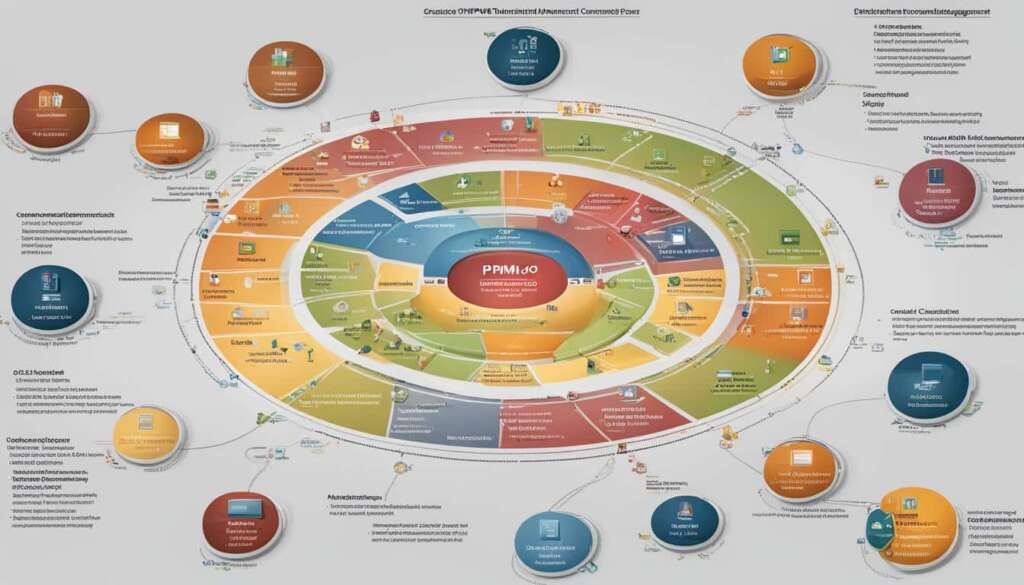Table of Contents
Project management can be complex, involving an array of tasks, resources, and stakeholders. In order to manage these complexities, many organizations implement a Project Management Office (PMO). But what is PMO in project management, and why is it important?
A PMO is a centralized unit that oversees and coordinates project management functions across an organization. Its goal is to facilitate project delivery and improve overall project outcomes. A well-run PMO provides a framework for consistent project management practices, which can lead to improved efficiency, cost savings and better risk management. PMO can also promote collaboration and communication among diverse project teams, and ensure that project objectives align with business objectives.
Key Takeaways
- PMO (Project Management Office) is a centralized unit that oversees and coordinates project management functions across an organization.
- PMO aims to facilitate project delivery and improve overall project outcomes by providing a framework for consistent project management practices.
- Effective PMO promotes collaboration and communication among diverse project teams and ensures that project objectives align with business objectives.
- PMO can lead to improved efficiency, cost savings, and better risk management.
- PMO is important for organizations to ensure successful project outcomes.
Defining the PMO
PMO, the acronym for Project Management Office, is a centralized department responsible for maintaining standardization and governance across an organization’s project management activities. In other words, it provides the necessary oversight, guidance, and support to ensure projects are aligned with the organization’s strategic objectives, and executed efficiently and effectively.
The PMO is responsible for defining and implementing project management processes, methodologies, and best practices; ensuring compliance with regulatory and legal standards; managing project resources; monitoring and reporting project status; and providing guidance and support to project teams, stakeholders and sponsors.
The PMO functions as a centre of excellence for project management within an organization, enabling it to improve resource utilization, optimize project outcomes, and achieve better alignment with business objectives. It facilitates collaboration, communication, and consistency by promoting standardization and providing a framework for project management.
Key Functions of a PMO
A PMO (Project Management Office) is responsible for various functions that are crucial to the success of project management. The key functions of a PMO include:
| Functions | Description |
|---|---|
| Project Portfolio Management | The PMO oversees and manages the project portfolio, ensuring that the projects align with the organization’s strategic goals. It also manages the resource allocation for each project and monitors the progress of each project. |
| Resource Allocation | The PMO ensures that resources are allocated efficiently and effectively, ensuring that the right people are assigned to the right projects. It also ensures that resources are utilized optimally and are available for other projects where necessary. |
| Project Governance | The PMO ensures that proper governance structures are in place for each project. It ensures that project risks are identified, monitored, and managed effectively. It also ensures that the project meets all compliance and regulatory requirements. |
| Reporting | The PMO provides regular and accurate reporting to stakeholders, ensuring that they are informed about project progress, risks, and issues. It also provides project performance metrics and assists with decision-making related to the project. |
The PMO functions as an enabler for effective project management, ensuring that projects are completed within scope, budget, and time. By performing these functions efficiently, the PMO contributes to the success of the organization by improving project outcomes and enhancing organizational efficiency.
Importance of PMO in Project Management
The PMO (Project Management Office) plays a vital role in ensuring the success of a project. Its importance lies in the fact that it provides a framework for efficient project management and helps in the smooth execution of projects.
- Improved Project Delivery: One of the significant benefits of having a PMO is that it enables timely and successful project delivery. With clear roles and responsibilities, the PMO can ensure that projects are delivered on-time, within budget, and meet quality expectations.
- Effective Risk Management: PMO plays a crucial role in project risk management. Through its structured approach for risk identification, assessment, and mitigation, PMO can help minimize project risks and proactively manage changes.
- Better Stakeholder Communication: PMO facilitates effective communication between project stakeholders by ensuring that stakeholders are kept informed and engaged throughout the project life-cycle. Clear reporting and communication channels reduce the risk of confusion and keep all parties updated with project progress.
- Enhanced Organizational Efficiency: An effective PMO enhances organizational efficiency by providing a central point of control for project management activities. By standardizing project management methods and practices, PMO ensures that projects are completed in a consistent, repeatable, and efficient manner.
“A well-implemented PMO can deliver significant improvements in project delivery, risk management, stakeholder communication, and overall project success.”
Conclusion
In conclusion, it is evident that PMO (Project Management Office) plays a crucial role in enhancing organizational efficiency and project outcomes. By providing oversight and guidance, a well-structured PMO can significantly contribute to improved project delivery, risk management, stakeholder communication, and aligning project objectives with the organization’s strategic goals.
A PMO is responsible for defining project management standards and processes, establishing project governance frameworks, monitoring project progress, allocating resources, and managing project portfolios. By performing these key functions, a PMO can ensure that projects are delivered on time, within budget, and meet stakeholders’ expectations.
Overall, having a PMO in place can help organizations achieve their project management objectives and drive success. It is, therefore, crucial for organizations to invest in establishing a robust PMO that is tailored to their needs and aligns with their strategic goals.
FAQ
What is a PMO?
A PMO, or Project Management Office, is a central body within an organization that oversees and provides governance to projects. It serves as a centralized hub for project management processes, methodologies, and best practices.
What is the role of a PMO in project management?
The role of a PMO in project management is to ensure standardized practices, improve project delivery, and facilitate effective communication and collaboration among project teams. It provides support, guidance, and oversight to project managers and their teams throughout the project lifecycle.
What are the key functions of a PMO?
The key functions of a PMO include project portfolio management, resource allocation, project governance, and reporting. It also facilitates strategic alignment, risk management, and quality control within the organization’s project management framework.
Why is a PMO important in project management?
A PMO is important in project management as it brings consistency, standardization, and efficiency to project processes. It helps ensure that projects are aligned with organizational goals and objectives, enhances project success rates, and improves overall project governance and control.
What is the significance of a PMO in enhancing organizational efficiency?
A PMO enhances organizational efficiency by streamlining project management practices, optimizing resource allocation, managing risks effectively, and providing a structured approach to project planning and execution. It promotes accountability, transparency, and collaboration, leading to improved overall performance and outcomes.












